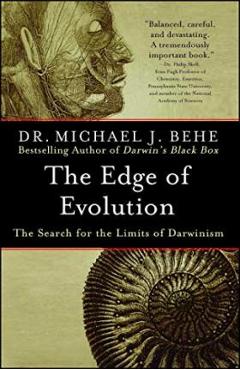The Edge of Evolution: The Search for the Limits of Darwinism - Michael J. Behe

Detalii The Edge of Evolution: The
libris.ro
94.19 Lei
117.74 Lei
Science
Michael J. Behe
The Edge of Evolution: The - Disponibil la libris.ro
Pe YEO găsești The Edge of Evolution: The de la Michael J. Behe, în categoria Science.
Indiferent de nevoile tale, The Edge of Evolution: The Search for the Limits of Darwinism - Michael J. Behe din categoria Science îți poate aduce un echilibru perfect între calitate și preț, cu avantaje practice și moderne.
Preț: 94.19 Lei
Caracteristicile produsului The Edge of Evolution: The
Comandă The Edge of Evolution: The Online, Simplu și Rapid
Prin intermediul platformei YEO, poți comanda The Edge of Evolution: The de la libris.ro rapid și în siguranță. Bucură-te de o experiență de cumpărături online optimizată și descoperă cele mai bune oferte actualizate constant.
Descriere magazin:
With Behe\'s book, the theory of intelligent design finally has its masterwork, a comprehensive scientific statement that draws the line between random and non-random mutation in nature, arguing that random mutation plays only a minor role in evolutionary change. When Michael J. Behe\'s first book, Darwin\'s Black Box, was published in 1996, it launched the intelligent design movement. Critics howled, yet hundreds of thousands of readers -- and a growing number of scientists -- were intrigued by Behe\'s claim that Darwinism could not explain the complex machinery of the cell. Now, in his long-awaited follow-up, Behe presents far more than a challenge to Darwinism: He presents the evidence of the genetics revolution -- the first direct evidence of nature\'s mutational pathways -- to radically redefine the debate about Darwinism. How much of life does Darwin\'s theory explain? Most scientists believe it accounts for everything from the machinery of the cell to the history of life on earth. Darwin\'s ideas have been applied to law, culture, and politics. But Darwin\'s theory has been proven only in one sense: There is little question that all species on earth descended from a common ancestor. Overwhelming anatomical, genetic, and fossil evidence exists for that claim. But the crucial question remains: How did it happen? Darwin\'s proposed mechanism -- random mutation and natural selection -- has been accepted largely as a matter of faith and deduction or, at best, circumstantial evidence. Only now, thanks to genetics, does science allow us to seek direct evidence. The genomes of many organisms have been sequenced, and the machinery of the cell has been analyzed in great detail. The evolutionary responses of microorganisms to antibiotics and humans to parasitic infections have been traced over tens of thousands of generations. As a result, for the first time in history Darwin\'s theory can be rigorously evaluated. The results are shocking. Although it can explain marginal changes in evolutionary history, random mutation and natural selection explain very little of the basic machinery of life. The edge of evolution, a line that defines the border between random and nonrandom mutation, lies very far from where Darwin pointed. Behe argues convincingly that most of the mutations that have defined the history of life on earth have been nonrandom. Although it will be controversial and stunning, this finding actually fits a general

Produse asemănătoare
Produse marca Michael J. Behe

Darwin\'s Black Box: The Biochemical Challenge to Evolution - Michael J. Behe
![]() libris.ro
libris.ro
Actualizat in 28/10/2025
111.6 Lei

The Edge of Evolution: The Search for the Limits of Darwinism - Michael J. Behe
![]() libris.ro
libris.ro
Actualizat in 15/12/2024
94.19 Lei

